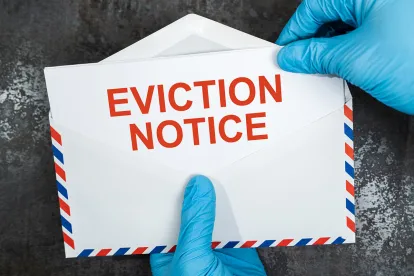As we noted in our September 4, 2019 alert, in an effort to supplement the action by Federal, State, and local governments to combat the spread of COVID-19, the Centers for Disease Control and Prevention, located within the Department of Health and Human Services (HHS), has taken the extraordinary step of issuing an Agency Order under Section 361 of the Public Health Service Act to temporarily halt residential evictions. The Order states that in the context of a pandemic, eviction moratoria—like quarantine, isolation, and social distancing—can be an effective public health measure utilized to prevent the spread of communicable disease and can allow State and local authorities to more easily implement stay-at-home and social distancing directives to mitigate the community spread of COVID-19.
Who is a “Covered Person” under the CDC Order?
A Covered Person is any tenant, lessee, or resident of a residential property who provides to their landlord, the owner of the residential property, or other person with a legal right to pursue eviction or a possessory action, a declaration under penalty of perjury indicating that:
- The individual has used best efforts to obtain all available government assistance for rent or housing;
- The individual either (i) expects to earn no more than $99,000 in annual income for Calendar Year 2020 (or no more than $198,000 if filing a joint tax return), (ii) was not required to report any income in 2019 to the U.S. Internal Revenue Service, or (iii) received an Economic Impact Payment (stimulus check) pursuant to Section 2201 of the CARES Act;
- The individual is unable to pay the full rent or make a full housing payment due to substantial loss of household income, loss of compensable hours of work or wages, a lay-off, or extraordinary out-of-pocket medical expenses;
- The individual is using best efforts to make timely partial payments that are as close to the full payment as the individual's circumstances may permit, taking into account other nondiscretionary expenses; and
- Eviction would likely render the individual homeless—or force the individual to move into and live in close quarters in a new congregate or shared living setting—because the individual has no other available housing options.
Key Moratorium Provisions:
- The Order prevents a Covered Person from being evicted or removed from a residential property (including houses, buildings, mobile homes or land in a mobile home park but not including hotels, motels, or temporary accommodations) from September 4, 2020 through December 31, 2020.
- Tenants or other Covered Persons must provide an executed CDC Declaration form or similar declaration under penalty of perjury to the landlord, owner, or other person has a right to evict them. Each adult listed on the lease, rental agreement, or housing contract should likewise complete and provide a declaration.
- The Order does not relieve a Covered Person from any obligation to pay rent, make a housing payment, or comply with any other obligation that the individual may have under a tenancy, lease, or similar contract, and such individual can be evicted for reasons other than not paying rent or making a housing payment (e.g., if the tenant engages in criminal activity, threatens the health and safety of other residents, damages property, violates building codes or health ordinances, etc.).
- The Order does not preclude the right of a landlord or owner from charging or collecting of fees, penalties, or interest as a result of the failure to pay rent or other housing payment on a timely basis, under the terms of any applicable contract.
- The Order does not apply in any State, local, territorial, or tribal area with a moratorium on residential evictions that provides the same or greater level of public-health protection than the requirements listed in this Order, and State, local, territorial, and tribal authorities can impose additional requirements that are more restrictive than the requirements in the Order.
- Violations of the CDC Order can result in criminal penalties Under 18 U.S.C. 3559, 3571; 42 U.S.C. 271; and 42 CFR 70.18:
- a person violating the Order may be subject to a fine of no more than $100,000 if the violation does not result in a death or one year in jail, or both, or a fine of no more than $250,000 if the violation results in a death or one year in jail, or both, or as otherwise provided by law.
- an organization violating this Order may be subject to a fine of no more than $200,000 per event if the violation does not result in a death or $500,000 per event if the violation results in a death or as otherwise provided by law.
Due to the potential criminal penalties for violations of the CDC Order, Landlords and owners of residential property should consult with legal counsel before taking any steps to evict a Covered Person.




 />i
/>i

